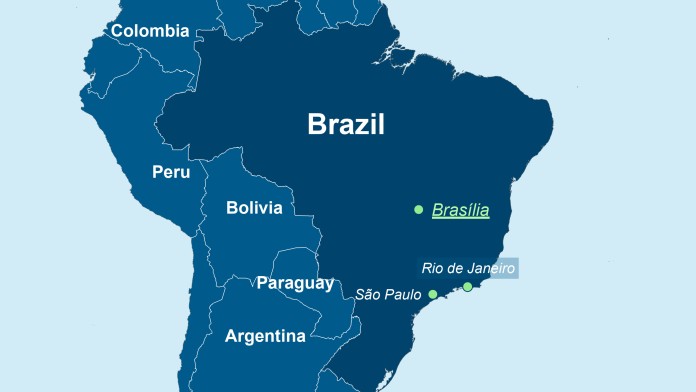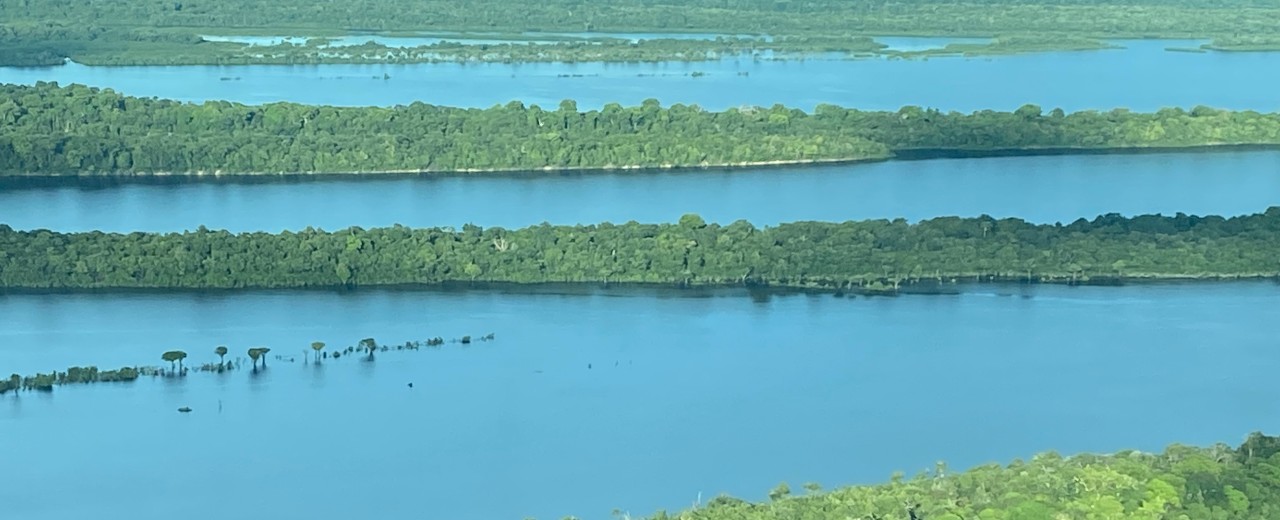
As of: 06/2025
The Amazon Fund is used to protect the rainforest in Brazil. Its aim is to combat deforestation and to promote the sustainable use of resources in order to preserve the rainforest in the Amazon Basin, which is important for the global climate. Between 2016 and 2024, KfW contributed a total of around EUR 90 million to the fund on behalf of the German Federal Government and, together with Norway, is one of the most important donors to the fund. The fund, which was established in 2008, has already promoted more than 120 projects that contribute to forest protection and biodiversity conservation.
The Amazon is the world's largest tropical rainforest covering more than 5.5 million square kilometers. It belongs to the territory of nine nations, but 60 percent is in Brazil. The forest has a significance for the climate of the entire earth. It is also home to a tremendous biodiversity. The Amazon and its tributaries provide drinking water storage for several million people. A large part of the rural population lives from the forest and its resources. Agriculture throughout the country depends on the water cycles of the Amazon.
So the importance of the forest cannot be overestimated, yet exploitation is taking place. Illegal deforestation remains a major concern and it is estimated that almost 17% of the original land has already been irretrievably lost. The remaining forest is under high pressure to use. The main causes of deforestation are an expansion of agricultural land and uncontrolled settlements.

The Amazon Fund was set up in 2008 by the Brazilian government and the Brazilian development bank Banco Nacional de Desenvolvimento Econômico e Social (BNDES). The aim is to help protect the rainforest and support the country in achieving its international climate targets. These goals include reducing annual deforestation in the Brazilian Amazon. For the period from 2005 to 2020, an 80% reduction in deforestation rates was envisaged, which could already be achieved in 2012. Since then, forest protection in Brazil has undergone a period of ups and downs. Particularly since 2018, deforestation has risen rapidly again as important protection measures had been suspended by the government. Since the new government took office in 2023, this trend has been reversed, and Brazil is currently working towards net-zero deforestation by 2030. As part of the Amazon area Action Plan on Preventing and Controlling Deforestation (PPCDAm), this means that all illegal deforestation will be fully halted, while legal deforestation will be compensated by afforestation.
Germany has so far paid around EUR 90 million into the fund through KfW. Another major donor is the Norwegian Government. The Brazilian oil company Petrobras has also supported the fund with more than USD 7 million. The size of the fund is currently close to USD 1.3 billion. The political turnaround of the new government, which has made forest conservation a priority again, has encouraged other donors to join the fund as well. The UK, Denmark, Switzerland, the US and Japan deposited a further EUR 100 million between December 2023 and December 2024. Other donors, such as the European Union, have pledged funds that are expected to be deposit shortly.
According to the new NDC published in 2024, Brazil aims to halt illegal deforestation completely by 2030 and to reduce its GHG emissions by up to 40% by 2035 compared to 2005. The development of the Amazon rainforest is meticulously monitored and evaluated by satellite images. Deforestation figures, emission levels and primes for reduced emissions are recorded online in a publicly available national carbon register.
The reduction and the control of deforestation requires considerable efforts, for example for the establishment and the management of protected areas, the equipment and funding of control authorities and the renunciation to agricultural use. The Amazon Fund is therefore helping to support Brazil in the funding of these efforts. Science and research projects are also financed by the Fund.
The local population, who gain their livelihoods in harmony with the tropical forest, in particular indigenous and traditional peoples, small farmers and smallholders, also benefit from projects covered by the Amazon Fund, including, for example, the promotion of sustainable supply chains for non-timber products that can be extracted from intact forests. Today, the Amazon Fund’s portfolio consists of more than 120 projects, which could be subsidised with almost USD 650 million.
The fund promotes measures to improve the living conditions of people living in rain forests, because as long as the population can make a living from the sustainable use of forest resources, the forest will be better protected. This is an incentive with regard to the collection and processing of rubber, acai, andiroba and other fruits and oils from the forest. Support is also being provided for the establishment and management of modern agroforestry systems. Sustainable fishing and fish farming, in line with the restrictions imposed on protected areas and endangered species, also provide an important livelihood in the region. In addition, the creation of alternative income opportunities can reduce pressure on natural resources and prevent over-exploitation. A total of 239,000 people have benefited from the projects promoted by the fund so far. In addition, numerous research results on the Amazon forest have been published.
The success of the fund brings benefits for global climate action, as well as for the protection of the environment, biodiversity and the improvement of the living conditions of the local population, through sustainable economic development. The GHG emissions avoided so far by the fund are estimated at 263 million tons of CO2 - roughly equivalent to the annual GHG emissions of the German energy sector.
Deforestation in the Amazon region fell back to 3,739 km²/year in 2024 and it is hoped that it will continue to fall in the coming years. However, due to the negative effects of climate change, long periods of drought are also causing more and more frequent forest fires in the Amazon rainforest. In 2024, the Amazon Fund therefore launched its new initiative of up to approximately EUR 65 million to implement forest fire protection measures in the nine Amazon states.
The project contributes to the achievement of these following United Nations Sustainable Development Goals:
KfW Group
KfW Development Bank
Biodiversity and natural resources – Latin America and the Caribbean
Carola.Griebenow@kfw.de
KfW Office, Brasilia
kfw.brasilia@kfw.de
Share page
To share the content of this page with your network, click on one of the icons below.
Note on data protection: When you share content, your personal data is transferred to the selected network.
Data protection
Alternatively, you can also copy the short link: https://www.kfw-entwicklungsbank.de/s/enzBy4zY
Copy link Link copied